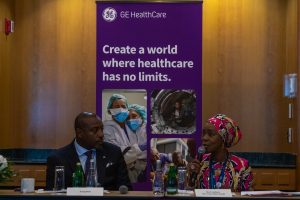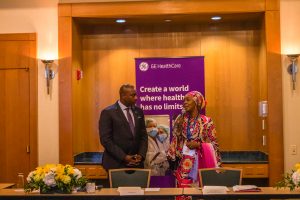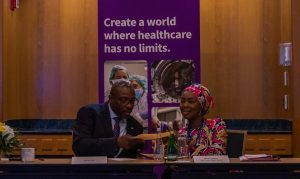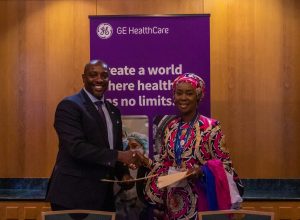FROM March 14th, 2024
March 14, 2024 – New York City: The Wellbeing Foundation Africa proudly announces that its Founder & President, Her Excellency Toyin Saraki, has joined the esteemed AstraZeneca Global Breast Cancer Care Council. H.E. Mrs. Saraki’s appointment signifies a significant step towards advancing global efforts to combat breast cancer and improve healthcare outcomes for women in Nigeria and worldwide.
The AstraZeneca Global Breast Cancer Care Council, a group of advisory experts across clinical research, advocacy and policy, aim to establish a comprehensive global policy and programmatic framework which fosters the best standards of care for breast cancer patients. H.E. Mrs. Saraki’s expertise and dedication to women’s health, particularly in Africa, will play a pivotal role in shaping strategies to achieve the ultimate ambition of the Sustainable Development Goals by 2030, in alignment with the World Health Organization’s Global Breast Cancer Initiative, to reduce global breast cancer mortality by 2.5% and prevent 2.5 million deaths by 2040, through addressing critical issues such as early detection, access to quality and complete treatment, and patient support services.
Breast cancer remains a pressing issue in Nigeria and globally, with millions of lives affected each year. According to the WHO, breast cancer is the most common cancer in women of child-bearing age and the leading cancer for women in Nigeria, with one of the highest prevalences and lowest rates of survival globally. Recognising these challenges, the council will focus on key areas including increasing survival rates, reducing chances of recurrence, and enhancing the quality of life for breast cancer survivors, while advocating for comprehensive clinical practice, patient-centred advocacy, policy and national guidelines.
Her Excellency Toyin Saraki expressed her gratitude for the opportunity to collaborate with AstraZeneca and fellow council members, stating, “I am deeply honoured to join the AstraZeneca Global Breast Cancer Care Council and play a pivotal role in advancing breast cancer care not only in Nigeria and across Africa but importantly, and ambitiously, on a global scale. My commitment lies in bridging the existing inequities in breast cancer outcomes through systematic improvements in access to resource-appropriate and quality services. This includes prioritising health promotion and early detection strategies, ensuring timely diagnosis, and advocating for comprehensive breast cancer management protocols. Together, we will work tirelessly to make tangible progress in the fight against breast cancer and improve the lives of countless individuals and families affected by this disease.”
H.E. Mrs. Toyin Saraki’s appointment underscores her unwavering commitment to improving healthcare outcomes and championing women’s rights globally. As a renowned advocate for maternal and child health, she brings a wealth of experience in healthcare policy, advocacy development and grassroots community engagement to the council. Her leadership will undoubtedly drive impactful initiatives that resonate with diverse communities across the globe.
The Wellbeing Foundation Africa extends its congratulations to Her Excellency Toyin Saraki on this prestigious appointment and looks forward to the transformative impact of her leadership within the AstraZeneca Global Breast Cancer Care Council.
For Global media inquiries, please contact: Zelia Bukhari, Global Health Advocacy and Policy Manager at Her Excellency Toyin Saraki’s Global Office and Philanthropy – zelia.bukhari@wbfafrica.org.
FROM February 10th, 2024
I am delighted to announce our new The Wellbeing Foundation Africa programme in partnership with the esteemed Liverpool School of Tropical Medicine to advance the EmONC Competency-Based Curriculum for Resident Doctors in OBGYN at the National Postgraduate Medical College of Nigeria.
This collaboration is aimed at enhancing the availability of quality advanced Emergency Obstetric and Newborn Care services in both national and sub-national hospitals. By equipping the National Postgraduate Medical College of Nigeria with the capacity to deliver advanced EmONC competency-based training, we’re making significant strides in fortifying Nigeria’s healthcare workforce.
Under the Global Health Workforce Programme Grant, funded by the UK Department of Health and Social Care and managed by the Tropical Health and Education Trust – THET, this initiative underscores WBFA’s dedication and efforts in building resilient health systems post-pandemic and advancing Universal Health Coverage goals, including the United Nations Sustainable Development Goal 3.
This programme will leverage expertise from the Royal College of Obstetricians and Gynaecologists (Nigeria Liaison Group) and experienced master trainers in advanced EmONC from LSTM. Implemented on the frontlines by The Wellbeing Foundation Africa in collaboration with LSTM – Liverpool School of Tropical Medicine, this transformative partnership will make significant strides in improving maternal and newborn healthcare outcomes across Nigeria, through engaging stakeholders in postgraduate medical education, establishing advanced EmONC Centers of Excellence in Abuja and Lagos, and ensuring sustainable operations for postgraduate OBGYN revision courses.
In the past ten years THET has reached over 100,000 health workers across 31 countries in Africa, the Middle East and Asia in partnership with over 130 UK institutions, and as Founder of THET, Professor Sir Eldryd Parry, once said, if there’s mutual trust and a willingness on both sides to learn from each other, a readiness to adapt and a readiness to try new things then good work will happen. The Wellbeing Foundation Africa is pleased to uphold this commitment across Nigeria, fostering trust with a commitment to both teaching and learning.
In strengthening the capacity of the National Postgraduate Medical College of Nigeria, this project is funded through the Global Health Workforce Programme, which is funded by the UK department of Health and Social Care (DHSC) for the benefit of the UK and partner country health sectors.
FROM September 25th, 2023
The Wellbeing Foundation Africa (WBFA) and GE HealthCare have taken a significant step towards improving maternal and fetal outcomes in Nigeria by signing a Strategic Cooperation Agreement (SCA) to equip midwives and nurses with the necessary knowledge and skills to effectively use ultrasound machines.
This initiative aims to empower healthcare providers with the tools to deliver better care to expectant mothers and their unborn babies. As part of this collaboration, GE HealthCare has donated eight Vscan ultrasound devices. These compact, portable devices are well-suited for use in resource-limited settings, where accessing traditional ultrasound machines may be challenging.
The agreement was ceremonially signed by Her Excellency Mrs Toyin Ojora Saraki, Founder & President of the Wellbeing Foundation Africa, and Mr Eyong Ebai of GE HealthCare at The Sofitel Hotel on the sidelines of the United Nations General Assembly in New York.


In addition to the donation, WBFA and GE HealthCare are conducting comprehensive training for nurses and midwives which will impact over 96,000 mothers this year alone. These training programs in the states of Lagos, Abuja, and Kwara, include theoretical and practical sessions. Participants will receive hands-on training on the use of the Vscan device, covering basic principles of ultrasound technology, image acquisition, interpretation, reporting, and even basic obstetric ultrasound scans.
According to the World Health Organization, the Maternal Mortality Rate in Nigeria in 2017, was estimated at 917 per 100 000 live births; it increased by nearly 14% in 2020 to reach 1047 deaths2 with evidence suggesting that the increase in rates is due to three common signs of delay: in making the decision to seek maternal healthcare, in locating and arriving at a medical facility, and in receiving skilled pregnancy care when a woman gets to the health facility.


Her Excellency Mrs Toyin Ojora Saraki, Founder & President of the Wellbeing Foundation Africa said “This collaboration between WBFA and GE HealthCare is a significant milestone in our mission to promote the wellbeing of expectant mothers across Nigeria. With the power of ultrasound technology, we can now detect warning signs early, ensuring the health and safety of both mothers and babies. By providing Vscan devices, delivering comprehensive training, and raising awareness within communities, WBFA and GE HealthCare is working towards healthier pregnancies, safer deliveries, and brighter futures for mothers and babies across Nigeria.”
Mr. Ebai from GE HealthCare said “We are proud to support the Wellbeing Foundation Africa in their mission to improve maternal and fetal outcomes in Nigeria. This will enable critical healthcare services in remote areas; GE HealthCare’s involvement supports our strategy in Africa to providing healthcare professionals with the latest technology, we are equipping them with the means to detect potential complications early, ultimately saving lives.”
Read the Maternal Mortality Regional Factsheet.
View this post on Instagram
FROM September 19th, 2023
New York, United States – The year 2023, midpoint of the United Nations Sustainable Development Goals, marks a critical turning point in the global conversation around adolescent wellbeing and maternal healthcare. The Wellbeing Foundation Africa was proud to join the Clinton Global Initiative (CGI) meeting this September, bringing together influential global players to address the pressing needs of adolescents and to shine a light on a critical, often-overlooked phase of maternal health: the fourth trimester.
More than ten global organisations, including the Wellbeing Foundation Africa in partnership with Reckitt joined forces with Fondation Botnar to commit to action aimed at tackling the challenges faced by the world’s 1.8 billion adolescents, including water, sanitation and hygiene, focused on our programming, Dettol Nigeria Hygiene Quest.
Alongside this, at CGI, I was honoured to contribute to ‘The Fourth Trimester: How to Provide Postpartum Support and Reduce Post-Birth Mortality’, addressing the critical issue that demands our immediate attention: the fourth trimester, that often-overlooked period from birth to 12 weeks. This is a time when the delicate dance of mother-baby bonding unfolds, and mothers embark on the journey of physical recovery from childbirth.
This phase represents a time of profound vulnerability for mothers as they navigate physical and emotional changes, including sleep deprivation, hormonal fluctuations, and the responsibility of nurturing a newborn. Unfortunately, inadequate support during the fourth trimester can lead to long-term health issues, including postpartum depression, anxiety, and increased risk of chronic illnesses.
Nigeria, like the United States, faces similar challenges in maternal healthcare. Maternal mortality rates remain a pressing concern, particularly for black, asian and minority ethnic rural and underserved communities in the USA. In this pivotal moment in history, it is imperative that we recognize the urgency of these matters and take global action to ensure that mothers and babies not only survive but thrive during the critical phases of healthcare.
As we unite in our efforts to protect the wellbeing of mothers, their newborns and adolescents worldwide, let us forge a path toward a brighter, healthier future.
View this post on Instagram
FROM September 12th, 2023
London, United Kingdom: A global group of experts from the environmental, business, political, and philanthropic worlds have formed the 2023 Terra Carta Seal Expert Review Panel. The Sustainable Markets Initiative is announcing the seven distinguished panellists who will evaluate and select the 2023 Terra Carta Seal Award winners.
Launched in 2021 at COP26 by His Majesty King Charles III when he was Prince of Wales, the Terra Carta Seal recognises global companies that are actively leading the charge to create a climate and Nature-positive future. In May, the Sustainable Markets Initiative announced its partnership with Verdantix, an independent research firm that acts as a thought-leader for world-enhancing innovation. The Expert Review Panel will work with Verdantix to evaluate nominations and assess their alignment with the ten Terra Carta articles.
The 2023 Terra Carta Seal Award Expert Review Panel are:
Toyin Saraki has severally served as a judge on the annual MIT Solve competition of the Massachusetts Institute of Technology, and as a judge of the Cannes Lions Film Festival. Toyin also recently adjudicated as a Grand Global Jury Member of the Fight for Access Accelerator Nigeria, led by Reckitt and Yunus Social Business (YSB).
Based on agreed sustainability criteria, select companies are invited on an annual basis to apply for the Terra Carta Seal. Once invited, companies will need to demonstrate the success of a high impact, large scale company-wide project, initiative or strategy which aligns with one or more of the ten Terra Carta Articles. Verdantix, leveraging its 15 years of experience in climate and sustainability research and analysis, will support the Terra Carta Seal evaluation process by assessing the eligibility and impact of each nominated project against existing recognised global sustainability criteria.
Her Excellency Toyin Saraki, Founder-President of The Wellbeing Foundation Africa (WBFA), said: “I am deeply honoured and excited to join the esteemed 2023 Terra Carta Seal Expert Review Panel. This prestigious initiative, launched by His Majesty King Charles III at COP26, holds the promise of a brighter and more sustainable future for our planet. It is heartening to see global leaders from diverse backgrounds come together to recognize and reward companies that are committed to positive change for both our environment and society.”
“The Terra Carta Seal Award represents a powerful commitment to addressing climate change and nurturing our natural world. I look forward to working alongside my distinguished fellow panellists and collaborating with Verdantix to evaluate nominations and ensure alignment with Terra Carta’s ten articles. Together, we will help identify and celebrate companies that are making a real difference in the fight against climate change.”
“This initiative is a testament to the power of collective action and shared responsibility. I am eager to contribute to this important mission and continue the work of promoting sustainability and wellbeing in Africa and around the world.”
Jennifer Jordan-Saifi, Sustainable Markets Initiative CEO, said: “It is an honour to have such a global and diverse group of sustainability experts to be part of the 2023 Terra Carta Seal Awards. Building on our partnership with Verdantix, the Expert Review Panel will further ensure an objective and rigorous evaluation process, rooted in sustainability excellence, for all nominees.”
David Metcalfe, Verdantix CEO, said: “Empowering seven judges representing diverse organisations and countries to make the final decision on Terra Carta Seal recipients, embeds independence, expertise and objectivity at the heart of our awards process.”
Applications for the 2023 Terra Carta Seal Award close Friday, 29 September.
FROM April 23rd, 2020
The World Health Organization was designed to address threats exactly like COVID-19—where global cooperation is our only chance of success.
The global community is racing to slow down the spread of COVID-19, a pandemic that has claimed the lives of over 160,000 people globally and sickened over 2 million more. As researchers and epidemiologists work around the clock to find a solution to halt both the deaths and the spread of the disease, our health workers are leaving loved ones at home to fight on the front lines of this crisis. I am moved daily by the stories of those doctors, midwives, nurses and other essential workers, who are working tirelessly to keep us safe, facing the dangers head-on, often with inadequate equipment and information.
Much of the world is locked down, isolated in households and communities, renewing and deploying the age-old and time-tested techniques of personal, social, surface and environmental hygiene, which all depend on the availability of clean water—an essential resource often scant where it is needed most. In Africa, the virus has spread to dozens of countries within weeks. Governments and health authorities across the continent are striving to limit widespread infections.
As always in times of crisis, the most vulnerable among us will be the ones hit hardest. Women and girls will suffer the most from this disease, and we have already seen a rise in gender-based violence and rights violations of pregnant women. Sufferers of domestic violence are now locked down with their abusers, isolated from their support systems, and other at-risk groups are unable to access routine services. The ripple effect of COVID-19 runs far beyond the disease itself. Humanity will bear the scars of this pandemic for many years to come.
Around the world, we are seeing countries and communities acting both together and apart. Fear is impeding mechanisms for an effective response to the coronavirus pandemic, giving rise to anger, racism, a rhetoric of blame and a dangerous spread of misinformation. Beyond health services, countries with large ratios of informal economic sector citizens are struggling to feed themselves, increasing the present hunger and suffering, as well as the undeniably unwelcome prospects of unrest.
Now more than ever, the world needs a well-functioning global organization designed to facilitate international coordination. The global community must unite behind a strong World Health Organization, an institution designed to address exactly this kind of global issue, our standard-bearer in these unprecedented times for this unprecedented virus. Countries need factual information based strictly in science with the benefit of a global perspective to ensure the most vulnerable communities have the support and information they need to survive.
The WHO works closely with governments to provide evidence-based guidelines for response and facilitate adaptation to the country context. Remote support is being provided to affected countries on the use of electronic data tools, so national health authorities can better understand the outbreak in their countries. Preparedness and response to previous epidemics is providing a firm foundation for many African countries to tackle the spread of COVID-19. Following their lead, which has urged nations to track and trace in order to tackle and treat the coronavirus, my organization, the Wellbeing Foundation Africa, has partnered with Pocket Patient MD to launch an app-based digital platform that enables individuals across Nigeria to run a health check and identify early symptoms of COVID-19.
Where basic preventative measures by individuals and communities remain the most powerful tool to prevent the spread of COVID-19, the WHO is helping local authorities craft radio messaging and TV spots to inform the public about the risks of COVID-19 and what measures should be taken. The organization is also helping to counter disinformation and is guiding countries on setting up call centers to ensure the public is informed. Every country is a beneficiary and a partner of the WHO’s work.
In the same vein, it is inconceivable to imagine a healthy future for our world without acknowledging the pivotal role of the United States in ensuring we realize it. The WHO has operated with the majority of its funding coming via the U.S. government throughout its 70-year history. We must recognize and respect the interconnected nature of our world, the relationships between countries and institutions, and the significant roles of member states in enabling such important institutions to function and deliver during these crucial times. We must prioritize unity and diplomacy at all levels.
COVID-19 is cruel in many ways. Many of us have been shaken by the loss of a loved one, made all the harder by separation enforced by lockdowns. But we cannot allow it to divide us, to pit us against one another—against countries, organizations and neighbors. If we allow that perspective to prevail, we will not only lose ourselves and experience greater isolation, we will also make ourselves more vulnerable. We must come together to manage this shared challenge, show solidarity as country and institutional leaders, advocates and allies, health workers and communities. We know, through hard-earned experience, that global cooperation is our only chance of success.
While many nations have attempted to build health security borders to combat the pandemic, COVID-19 is a stark reminder that humans are connected, and that what happens in one country can impact the everyday lives, social fabrics and economies of countries far away. Working individually does not shield us from the global framework in which we are operating – we are part of an interconnected world, and when we respond accordingly, we can more accurately and effectively combat our shared challenges.
Human connectivity holds power. The positive impact of our collective will to physically distance from one another alone shows what power we hold. In working together to promote unity, overcome global inequality and support measures to protect public health, we are striving to ensure that no one is left behind in our response to the pandemic.
Toyin Saraki is the founder and president of the Wellbeing Foundation Africa, the inaugural global goodwill ambassador for the International Confederation of Midwives and special adviser to the independent advisory group of the World Health Organization’s regional office for Africa.
The views expressed in this article are the writer’s own.